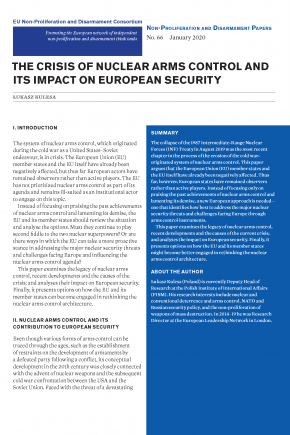The Crisis of Nuclear Arms Control and its Impact on European Security
The collapse of the 1987 Intermediate-Range Nuclear Forces (INF) Treaty in August 2019 was the most recent chapter in the process of the erosion of the cold war-originated system of nuclear arms control. This paper argues that the European Union (EU) member states and the EU itself have already been negatively affected. Thus far, however, European states have remained observers rather than active players. Instead of focusing only on praising the past achievements of nuclear arms control and lamenting its demise, a new European approach is needed—one that identifies how best to address the major nuclear security threats and challenges facing Europe through arms control instruments.
This paper examines the legacy of nuclear arms control, recent developments and the causes of the current crisis; and analyses the impact on European security. Finally, it presents options on how the EU and its member states might become better engaged in rethinking the nuclear arms control architecture.

